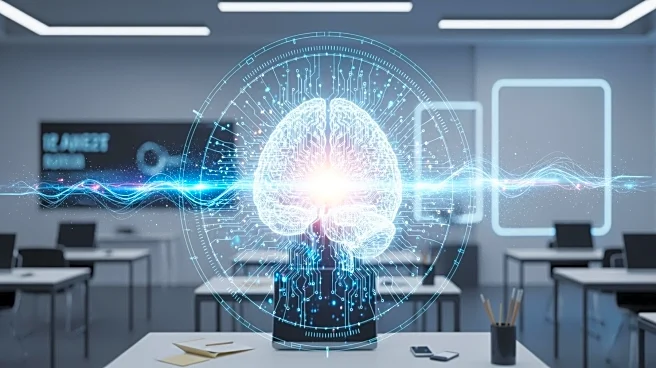What's Happening?
The education system is being urged to focus on developing core skills in students that will prepare them for an AI-driven world. The emphasis is on fostering curiosity, resilience, and creative problem-solving
rather than early specialization. These skills are seen as essential for students to use AI as a partner in innovation rather than just a tool for efficiency. The approach involves hands-on learning experiences that encourage critical thinking and adaptability, allowing students to navigate complex processes from idea to outcome. This educational shift aims to equip students with the confidence to imagine and create new tools, rather than merely following existing ones.
Why It's Important?
This educational approach is significant as it addresses the need for a workforce capable of leveraging AI for innovation rather than stagnation. By focusing on human skills such as critical thinking and problem-solving, students are better prepared to adapt to the rapid changes brought about by AI technologies. This preparation is crucial for ensuring that AI becomes a force for human growth, enabling society to tackle new challenges and opportunities. The shift in education also prompts a reevaluation of productivity, suggesting a move towards measuring outcomes rather than hours worked, which could lead to more balanced and fulfilling work lives.
What's Next?
The next steps involve integrating these educational principles into the K-12 curriculum, ensuring that students have ample opportunities to engage in creative and critical thinking activities. Schools may need to redesign their programs to include more hands-on projects that challenge students to think deeply about the role of AI in creativity and authorship. As these educational changes take root, there may be broader discussions about redefining productivity in the workforce, potentially leading to new societal norms around work-life balance and community involvement.
Beyond the Headlines
The deeper implications of this educational shift include ethical considerations about the role of AI in society and the importance of human-centered innovation. By fostering a mindset that values creativity and resilience, the education system can help mitigate the risks of AI-driven automation that prioritizes efficiency over human growth. This approach also encourages students to think critically about the ethical use of AI, preparing them to address potential challenges related to misinformation and the responsible development of technology.











